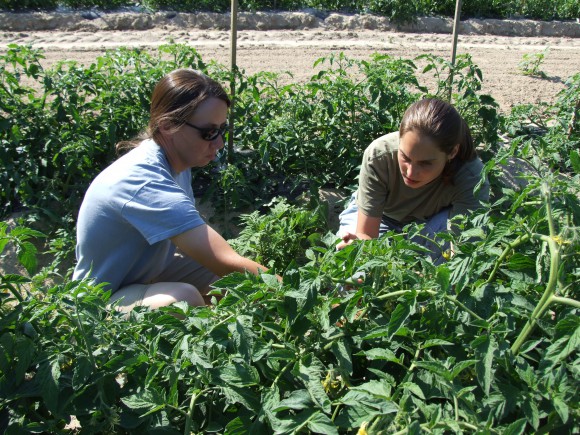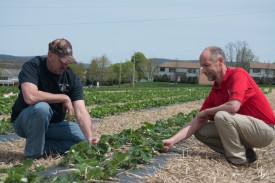
Jenny Carleo (r), RCE agricultural agent of Cape May County, discusses tomato crop management with farmer Jen Gleason of Hand’s Stand Market in Rio Grande, NJ.
Rutgers Cooperative Extension (RCE) was awarded a significant grant of $460,170 by the United States Department of Agriculture (USDA) as part of $17 million in new federal funding announced on Oct. 8 to benefit beginning farmers and ranchers across the U.S.
The three-year grant to Rutgers, awarded through the Beginning Farmer and Rancher Development Program administered by USDA’s National Institute of Food and Agriculture (NIFA), will be used by RCE to educate new and beginning farmers in New Jersey on how to grow high-value crops on small acreage.
“We are so pleased that Rutgers Cooperative Extension’s continuing programs to educate new and beginning farmers in the Garden State has received this important investment from the USDA in food production systems,” said Larry Katz, director of Rutgers Cooperative Extension and senior associate director of the New Jersey Agricultural Experiment Station, of which RCE is a part.
Funding was secured through a collaborative Rutgers proposal, “Ultra-Niche Crops for the Progressive, New Farmer,” which was prepared by Jenny Carleo (CC’99, GSNB ’03), agricultural agent, with the assistance of Jenn Matthews, project coordinator and agricultural consultant, with RCE of Cape May County. Among the collaborators are Robin Brumfield, specialist in farm management; Jeff Heckman, Rutgers Media Productions; Dan Kluchinski, chair of Department of Agricultural and Resource Management Agents; Meredith Melendez, agricultural agent, RCE of Mercer County; Pete Nitzsche, agricultural agent, RCE of Morris County; Nick Polanin (CC’82, GSNB’89), agricultural agent, RCE of Somerset County; Kenesha Reynolds-Allie, agricultural agent, RCE of Warren County; Rick VanVranken, agricultural agent, RCE of Atlantic County; and Andy Wyenandt, specialist in vegetable pathology, NJAES.
The goal of the project is to teach new and beginning farmers nationwide–virtually and in-person–about the cultivation, marketing and business management of farming 18 “ultra-niche crops, including strawberries, basil, roselle, sweet potato vine, hot peppers and mushrooms.
“We define “ultra-niche” as exceptionally high-value crops that can provide a significant source of income to the farmer while using minimal land area,” explained Carleo.
“New Jersey is already well-known for producing high quality and high value vegetables, herbs, and fruits. This federal grant will support our efforts to expand economic and agricultural life-style options for those seeking to enter this field at an exciting time when growing numbers of the public are seeking locally grown produce for their families,” explained Katz.
Educational programming will include crop selection, entrepreneurship and business training- including financial and risk management, as well as diversification and marketing techniques, she added.

Pete Nitzsche, (r) RCE agricultural agent of Morris County, examines strawberries with farmer Greg Donaldson at Donaldson Farms in Hackettstown, NJ.
Helping to guide the selection of crops as well as the implementation of this project will be a stakeholder advisory council comprised of farmers, Farm Credit East, and multiple agricultural support organizations, including the New Jersey Agricultural Society and the New Jersey Farm Bureau.
Through the project, farmers will be able to evaluate whether or not each crop will work for their operation, stressed Carleo. Among the resources to which farmers will have access are a series of video factsheets, virtual fieldtrips and crop profiles with budgets that will be available online through the university.
“We hope the ability to support your local farmer will be more readily accessible as a result of this impactful outreach and education,” said Katz.
“Our goal for this project is to equip our next generation of food producers to achieve early crop and financial success, as well as to help sustain the operations of existing farmers,” Carleo added.
According to the USDA, the Beginning Farmer and Rancher Development Program was first established by the 2008 Farm Bill and was continued in the 2014 Farm Bill. The program provides support to those who have farmed or ranched for less than 10 years. NIFA awards grants to organizations throughout the United States that implement programs to train beginning farmers and ranchers, which may take place through workshops, educational teams, training, or technical assistance.
Since 2009, 184 awards have been made for more than $90 million through the Beginning Farmer and Rancher Development Program. These awards are part of USDA’s deep commitment to empowering beginning farmers and ranchers across America.

